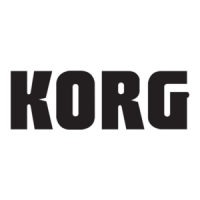Introduction
1
Introduction
ank you for purchasing Korg’s wavestate native soware synthesizer. To help you get the most out of your new
instrument, please read this manual carefully.
Main Features
Wave Sequencing 2.0
wavestate native features Wave Sequencing 2.0, a new synthesis engine inspired by Korg’s classic Wavestation.
Wave Sequencing 2.0 is a dynamic system. Instead of each Step being a matched set of sample, pitch, duration, etc., the
dierent parameters are separated into “Lanes.” Each Lane can have a dierent number of Steps, and its own start, end,
loop start, and loop end.
ese points (and other parameters in the Lanes) can in turn be modulated on a per-note basis, using velocity, LFOs,
envelopes, etc. Each time the sequence moves forward, values from the individual Lanes are combined to create the
output. e result can be either ever-changing rhythmic patterns or smooth, organic, crossfading timbres. Individual,
modulatable Step probabilities provide additional variation. Make Wave Sequences using the gigabytes of built-in
samples, or import your own using Korg’s free Sample Builder soware.
Filters
Add vintage character to your sounds with the aggressive MS-20 Lowpass or Highpass lters, or the strong, sweet
Polysix Lowpass. Shape and rene with a full collection of resonant 2-pole and 4-pole Lowpass, Highpass, Bandpass,
and Band Reject lters. Or, step outside the box with Korg’s unique Multi Filter, which creates modulatable blends of
multiple modes simultaneously.
Modulation
Most parameters can be modulated, with up to 4,000 modulation destinations per Performance, and no xed limit on
the total number of modulation routings. You can even modulate settings for individual Wave Sequence Steps! Each
modulation routing includes a primary modulation source, an intensity, and a secondary modulation source; the three
are multiplied together to create the modulation amount. A single destination, such as Filter Cuto, can have up to 31
incoming modulation routings.
Mod Knobs put macro transformations under your ngertips, making it easy to explore the sonic worlds inside
each Performance. Tweaking an existing sound? Quickly identify modulation sources using real-time displays of all
envelopes, LFOs, and other primary modulation sources. Easily create modulation routings using drag-and-drop,
and get an overview of all routings via the Mod List. Mod Processors let you transform modulation signals using
quantization, smoothing, curvature, and more.
Layers and Eects
For even more rich and complex results, layer up to four Programs together in a Performance–each with their own
eects and arpeggiator. e Vector Envelope and Joystick mix the individual voices of the four Layers, and can also
modulate any other parameters.
e wavestate native’s superb eects deliver production-ready sounds. Each Layer has three dedicated eects (Pre,
Mod, and Delay); additionally, the Performance has a Master Reverb and Master EQ.
Presets and Randomization
wavestate native comes with more than 250 factory Performances, and many more Programs, Wave Sequences, and
Eects Presets. Smooth Sound Transitions let previously-played voices and eects ring out naturally when you change
sounds.
Looking for even more inspiration? e “dice” icon at the top of the window generates new sounds via intelligent
randomization. Randomize the entire sound or just a part of it, such as the lter, the Sample Lane, or the eects. Use the
results directly, or as a jumping-o point for your own creations.
Fully compatible with the hardware wavestate synthesizer
wavestate native is the fully-compatible soware counterpart to the hardware wavestate synthesizer.

